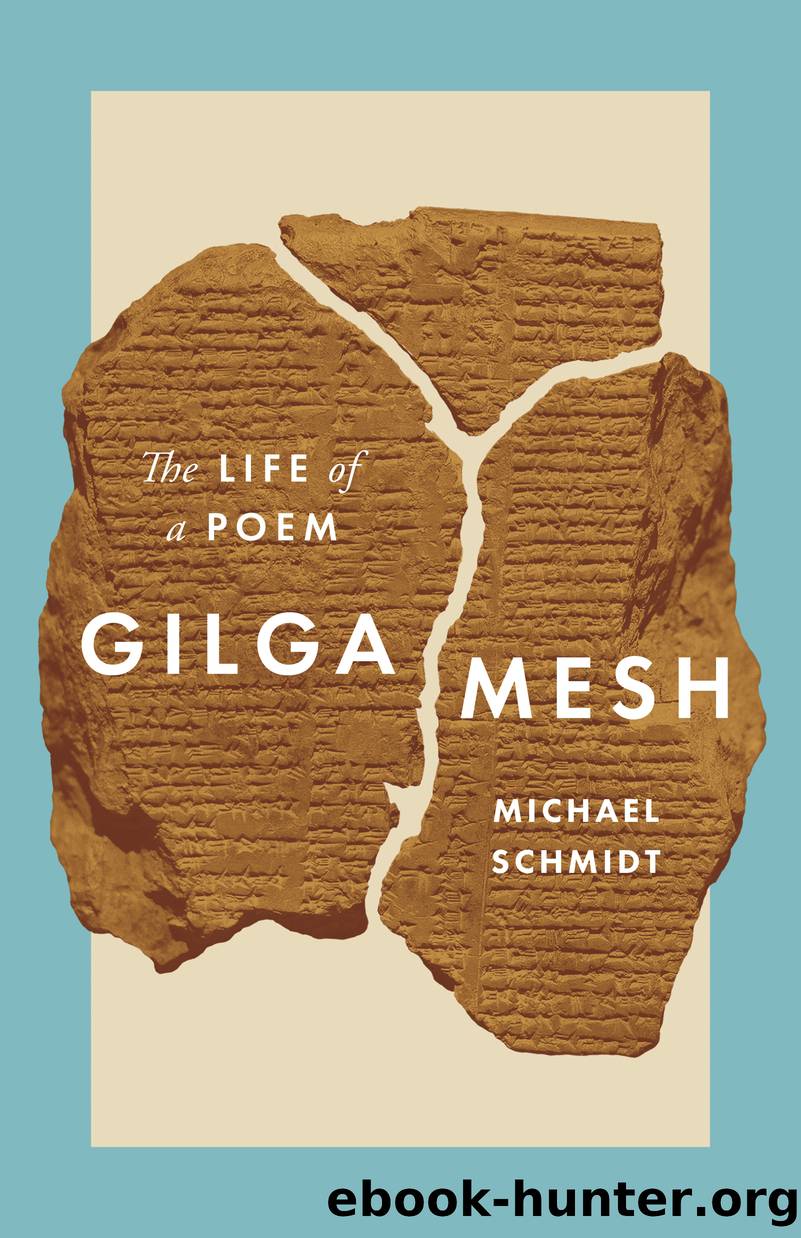Gilgamesh by Michael Schmidt

Author:Michael Schmidt
Language: eng
Format: epub
Publisher: Princeton University Press
Published: 2019-07-18T00:00:00+00:00
For such is the destiny [of mortal men,]
that the one who is alive.…. .
Andrew George particularly notes the way in which here Shiduri uses the stative or passive voice. Acceptance will lead to the contentment a man can know on earth, the sense of a living present and the future that is embodied in the ‘child’ who is not, incidentally, gendered. The tablet gives out, and when the Standard Babylonian tablet resumes, Gilgamesh has ignored her advice. He is entirely focused on his quest.
He asks Shiduri to tell him the way to Uta-napishti. The journey is impossible, she says. Even so, like the scorpion man before, she tells him how to go—across the gulf, which includes at its centre the Waters of Death. Without delay he sets out to find the boatman Ur-shanabi, carrying his axe in one hand and his dirk in the other.
It takes him less time to get to Ur-shanabi, not the month and fifteen days as Shiduri predicted, because Gilgamesh, being Gilgamesh, is always fleet of foot. It is odd how on all the journeys that occur, the difficult trip out, with trials and challenges, does not entail a comparable return. This problem of continuity presents itself to modern readers but evidently not, in these terms, to the poem or its original readers and audience.
Gilgamesh, true to his nature, fights with the stone men that work with Ur-shanabi, destroying them. (We move to the Old Babylonian tablet to bridge a gap.) Ur-shanabi and Gilgamesh then introduce themselves to one another, a curious order of events. (Then Tablet 10 resumes.)
Gilgamesh repeats to Ur-shanabi his deeds with Enkidu and his sorrow. The story of the maggot recurs. He wants to go to Uta-napishti. But with his own hands, says Ur-shanabi, he has destroyed the very means of propulsion by destroying the stone men. If he wants to go, it’s down to him: he must now make pine punting poles, immensely long and straight, to use in crossing the Waters of Death. Gilgamesh cuts and strips the pines. ‘He trimmed them and furnished them each with a boss.’ In terms of labour, this is his greatest challenge; while his more conventional adventures entailed courage and aggression, this requires solitary stamina. There is no Enkidu to share the labour with him.
Gilgamesh and Ur-shanabi punt across, and when the poles are used up Ur-shanabi takes off his shirt and Gilgamesh makes a sail of it. The wind propels them the rest of the way. Thus the Waters of Death are crossed in the usual time, three days.
Uta-napishti the Distant sees them coming and wonders why the stone men are broken. After the boat lands, Uta-napishti asks the same question that Ur-shanabi and Shiduri asked: why so wan and wasted? Again Gilgamesh tells of his exploits with Enkidu and repeats his lament, and again the maggot is seen to drop from Enkidu’s nostril. He acknowledges that he fears endless death and that he has come to ask Uta-napishti the secret of his mortal survival, beyond time.
Download
This site does not store any files on its server. We only index and link to content provided by other sites. Please contact the content providers to delete copyright contents if any and email us, we'll remove relevant links or contents immediately.
| African | Asian |
| Australian & Oceanian | Canadian |
| Caribbean & Latin American | European |
| Jewish | Middle Eastern |
| Russian | United States |
4 3 2 1: A Novel by Paul Auster(11074)
The handmaid's tale by Margaret Atwood(6874)
Giovanni's Room by James Baldwin(5895)
Big Magic: Creative Living Beyond Fear by Elizabeth Gilbert(4734)
Asking the Right Questions: A Guide to Critical Thinking by M. Neil Browne & Stuart M. Keeley(4599)
On Writing A Memoir of the Craft by Stephen King(4221)
Ego Is the Enemy by Ryan Holiday(4000)
Ken Follett - World without end by Ken Follett(3981)
The Body: A Guide for Occupants by Bill Bryson(3815)
Bluets by Maggie Nelson(3722)
Adulting by Kelly Williams Brown(3681)
Guilty Pleasures by Laurell K Hamilton(3600)
Eat That Frog! by Brian Tracy(3525)
White Noise - A Novel by Don DeLillo(3443)
The Poetry of Pablo Neruda by Pablo Neruda(3371)
Alive: The Story of the Andes Survivors by Piers Paul Read(3320)
The Bookshop by Penelope Fitzgerald(3237)
The Book of Joy by Dalai Lama(3234)
Fingerprints of the Gods by Graham Hancock(3222)
